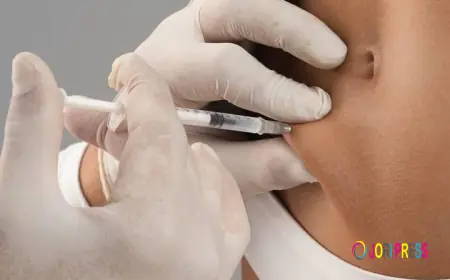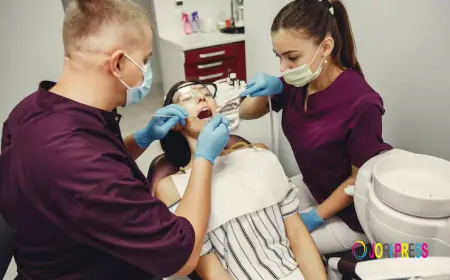The Role of a Sleep Apnea Doctor Near Me in Restoring Restful Nights
Find the right sleep apnea doctor near me to improve sleep quality, reduce snoring, and restore energy with expert diagnosis and effective treatments.
Sleep is essential for overall health, but when disorders like sleep apnea interrupt it, the effects can be serious. Many people search for a sleep apnea doctor near me because they struggle with loud snoring, daytime fatigue, and even long-term risks such as heart disease. Understanding the role of a sleep apnea doctor is the first step toward better sleep, improved energy, and a healthier life.
What Is Sleep Apnea?
Sleep apnea is a sleep disorder where breathing repeatedly stops and starts during the night. There are two primary types:
-
Obstructive Sleep Apnea (OSA): Caused by blocked airways, often from relaxed throat muscles.
-
Central Sleep Apnea (CSA): The brain fails to send proper signals to control breathing.
-
Complex Sleep Apnea: A combination of both.
Each type requires specialized evaluation and treatment, making it important to find a sleep apnea doctor near me who can identify the right approach.
Why a Sleep Apnea Doctor Is Essential
A sleep apnea doctor plays a critical role by:
-
Diagnosing the severity of the condition.
-
Recommending personalized treatment options.
-
Monitoring progress over time to ensure effectiveness.
-
Helping prevent complications like high blood pressure, heart disease, and diabetes.
Symptoms That Indicate You May Need a Doctor
Many people dismiss sleep apnea symptoms as “just snoring,” but the reality is much more serious. Signs that you should consult a sleep apnea doctor near me include:
-
Loud, chronic snoring.
-
Pauses in breathing during sleep (often noticed by a partner).
-
Waking up choking or gasping.
-
Constant daytime sleepiness or fatigue.
-
Morning headaches.
-
Difficulty concentrating.
Diagnostic Methods Used by Sleep Apnea Doctors
When you visit a sleep apnea doctor near me, the first step is diagnosis. Common methods include:
-
Sleep studies (Polysomnography): Monitors breathing, heart rate, oxygen levels, and brain activity during sleep.
-
Home sleep tests: Convenient tests that record data while you sleep at home.
-
Physical evaluations: Assessing risk factors like neck circumference, weight, and airway structure.
Treatment Options a Sleep Apnea Doctor May Recommend
Treatment is tailored to each patient’s condition and lifestyle. Common options include:
-
Lifestyle Changes: Weight loss, reduced alcohol consumption, and quitting smoking.
-
CPAP Therapy: A machine that keeps airways open by providing continuous airflow.
-
Oral Appliances: Custom mouthpieces that reposition the jaw to keep airways clear.
-
Surgery: For patients with severe structural airway blockages.
A skilled sleep apnea doctor near me ensures you get the right treatment for your specific needs.
How Sleep Apnea Doctors Improve Long-Term Health
Beyond improving sleep quality, treating sleep apnea can:
-
Lower blood pressure.
-
Reduce risk of heart disease and stroke.
-
Improve energy levels and focus.
-
Prevent type 2 diabetes complications.
-
Boost overall quality of life.
What to Expect in Your First Visit
Your first visit to a sleep apnea doctor near me usually involves:
-
A detailed discussion about your symptoms and medical history.
-
A physical exam focusing on your airway and breathing.
-
Recommendations for diagnostic tests like a sleep study.
-
A plan outlining next steps for treatment.
Tips for Finding the Right Sleep Apnea Doctor
When searching for the right sleep apnea doctor near me, consider:
-
Experience in treating sleep disorders.
-
Availability of diagnostic sleep studies.
-
Range of treatment options offered.
-
Positive patient reviews.
-
Clear communication and follow-up care.
Final Thoughts
If you find yourself constantly tired, snoring heavily, or struggling to breathe at night, don’t ignore the warning signs. A sleep apnea doctor near me can provide the expertise, tools, and treatments necessary to help you regain restful sleep and protect your long-term health.
FAQs
Q1. Can sleep apnea go away on its own?
No, sleep apnea rarely resolves without treatment. Professional evaluation and management are crucial.
Q2. Is CPAP therapy the only treatment option?
No, while CPAP is common, other options like oral appliances, lifestyle changes, and surgery may be recommended depending on your condition.
Q3. How do I know if I need a sleep study?
If you have symptoms like loud snoring, pauses in breathing, or constant fatigue, a sleep study may be necessary to confirm sleep apnea.
Q4. Is sleep apnea dangerous if untreated?
Yes, untreated sleep apnea increases the risk of heart disease, stroke, diabetes, and chronic fatigue.
Q5. How soon will I see improvement after starting treatment?
Many patients experience noticeable improvements in energy and sleep quality within a few days to weeks after starting treatment.
What's Your Reaction?
 Like
0
Like
0
 Dislike
0
Dislike
0
 Love
0
Love
0
 Funny
0
Funny
0
 Angry
0
Angry
0
 Sad
0
Sad
0
 Wow
0
Wow
0















































